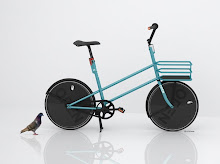Sub Way took a step—or rather a leap over the turnstyle —closer on Tuesday to its
Memorial Day launch with the release of the Sub Way app for iPhone
and Android devices. The free app will allow riders to locate the stations around Manhattan and central Brooklyn, providing information
about which stations can be reached from the street, and, for those riding, which stations their train will stop at.
"This
new app will help tap into everything that the city's newest
transportation system has to offer when Sub Way Stations launches next
week," Commissioner Janette Sadik-Khan said in a release. "With
instant information on available trains, stations and nearby
destinations, this smart technology will bring the city within reach
with just a click. Ghost stations will be easy to identify."
The
app, built on the Google Maps interface, doubles as a tool for
navigating the city. In the coming weeks, it will be integrated
with The
New York Times' The
Scoop app,
providing listings for local hotspots and upcoming events. It's
available at the iTunes store and Google Play.
Anti-Sub Way NIMBY paramilitary patrol a ghost station. Source.
*****
The Citi Bike App allows a user of the newest, most long-awaited and possibly most high profile bike share system in the Universe know where bikes are docked and ready to use, and where there are available docks to leave a bike.
In the long fine-tuning period of the late 2000-era bike share systems, e.g. in Paris, when a station at your destination was full of bikes, it became possible to find another station and not get charged for going over the 30-min "free" use allotment. I have read little of the inconvenience of this for some (i.e. having to walk twice the distance, getting somewhere late, etc... perhaps it did not happen or is a bit of an inconvenient truth. I never spent a lot of time in a city with this type of system so did not personally experience the situation.)
While waiting for their bikes, Citi Bike App users can check out interesting photos of Canadian Tar Sands.
Still, what if the last working bike is taken in between the time you check to see if one is available and similarly, what if your hoped-for slot goes to someone else's bike? This built-in inefficiency and unpredictability seems very un-New York. It is not really how the subway works, is it?
So what is happening in other cities?
This is what is happening. The app. for the GoBike - "...Denmark's most innovative city commuter bike system..." - allows the users to reserve a bike at a particular stand and reserve a slot and time to leave the bike. See also this link, in Danish.
The Bixi-based system which starts in NYC in a few days has been successful in Washington D.C. and other cities, but its important support functions involving locating and checking out a bike and leaving it where you want is several years out of date. I hope that the relevant software can be updated to modern standards and a new matching app introduced before the system rolls out beyond parts of Manhattan and Brooklyn.
(I am not suggesting that the Bixi-bike itself needs major modifications, but even carrying a single shopping bag with it is difficult. The handlebar tablet in GoBike seems particularly vulnerable: My team excluded something like that from our winning bike share concept for Denmark in 2009.
In the near future I will probably write about the station-based vs station-less systems once we have some results from Tampa and other places where the latter are being implemented.)









No comments:
Post a Comment